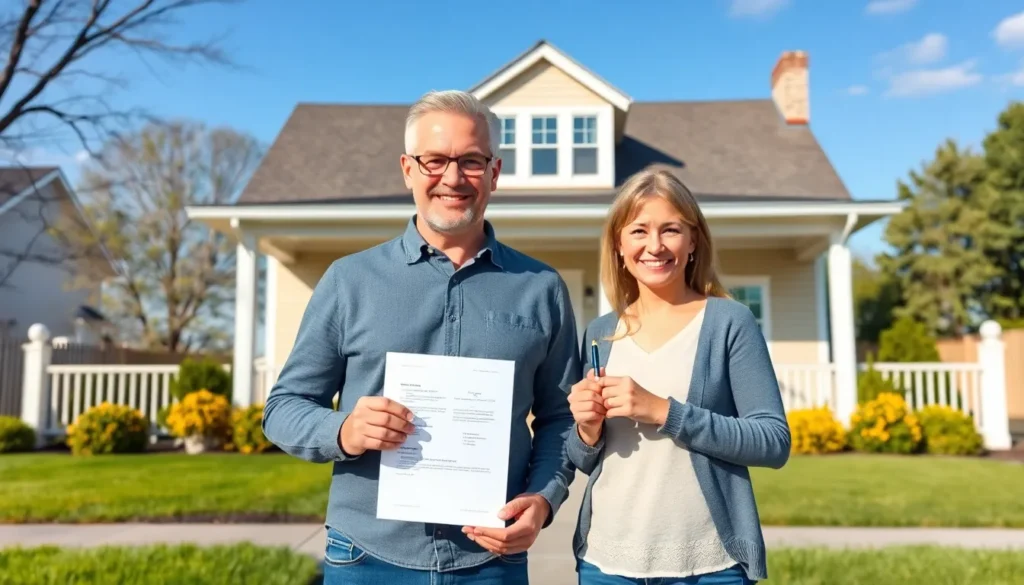When diving into the world of real estate, one might stumble upon the term “earnest money” and wonder if it’s just a fancy phrase for a down payment. Picture this: you find your dream home, and your excitement bubbles over like an overzealous pot of pasta. But wait! Before you can start planning your housewarming party, you need to navigate the nuances of earnest money.
Is it just a deposit to show you’re serious or does it also count toward that hefty down payment? Spoiler alert: it’s a bit of both, but with some twists. Understanding how these two financial pieces fit together can save you from a world of confusion and potential heartache. So let’s unravel this mystery and make sure your home-buying journey is as smooth as that perfect cup of coffee on a Monday morning.
Table of Contents
ToggleUnderstanding Earnest Money
Earnest money plays a vital role in the real estate transaction process. This financial commitment shows a buyer’s serious intent to purchase a property, setting the stage for negotiations.
Definition of Earnest Money
Earnest money refers to a deposit made by a buyer to secure a purchase agreement. Typically, this amount ranges from one to three percent of the home’s purchase price. While it’s often held in an escrow account, it demonstrates the buyer’s good faith toward completing the transaction. In some markets, larger deposits may reflect stronger buyer intentions. Sellers view earnest money as a reassurance that the buyer is committed.
Purpose of Earnest Money
The main purpose of earnest money is to incentivize the seller to take the property off the market. This deposit secures the buyer’s interest while the sale proceeds through inspection and financing. Should the buyer back out without a valid reason covered by the agreement, the seller may retain the earnest money as compensation. When the sale closes, earnest money often contributes to the overall down payment, reducing the amount the buyer needs to pay at closing. Thus, earnest money fortifies both parties’ interests in the transaction.
Earnest Money vs. Down Payment

Understanding the distinction between earnest money and down payment is essential in real estate transactions. These terms refer to different financial commitments within the home-buying process.
Key Differences
Earnest money acts as a good faith deposit, while the down payment represents a percentage of the home’s total purchase price. Typically, earnest money is considerably smaller, usually ranging from one to three percent of the purchase price. Conversely, down payments often range from three percent to twenty percent or more, depending on the mortgage requirements. The purpose of earnest money is to signal serious intent, whereas the down payment directly impacts the mortgage amount and dictates the buyer’s equity in the home.
How They Function in a Real Estate Transaction
Earnest money functions primarily to demonstrate a buyer’s commitment to purchasing a home, reassuring sellers during negotiations. This deposit is generally held in an escrow account until closing. In contrast, the down payment represents the upfront cash a buyer provides to secure a mortgage. The down payment reduces the loan amount needed and affects monthly mortgage payments. If a buyer backs out without valid justification, they risk losing the earnest money, while the down payment secures the loan and reflects a buyer’s investment in the property.
Scenarios Where Earnest Money Counts Toward Down Payment
Earnest money can contribute to the down payment under specific circumstances. Understanding these conditions helps buyers navigate the home-buying process.
Purchase Agreement Terms
Certain terms within the purchase agreement dictate how earnest money applies to the down payment. If the contract states that earnest money is credited toward the down payment, buyers can expect that deduction at closing. Generally, this amount reflects the buyer’s commitment and can range from one to three percent of the purchase price. Buyers must review the contract carefully to ensure clarity on how this deposit affects their down payment obligations. Working with a knowledgeable real estate agent can help clarify these terms and prevent misunderstandings.
Local Real Estate Practices
Local real estate practices also influence whether earnest money counts toward the down payment. In some markets, it’s common for earnest money to be applied directly to the down payment, while others may not follow this approach. Real estate professionals in a specific area often adhere to regional customs, affecting how earnest money is treated during a transaction. Researching local practices and regulations ensures buyers are well-informed about how earnest money can work for them. This understanding contributes to a more efficient home-buying experience and reassures buyers regarding their financial commitments.
Factors Influencing Earnest Money Amounts
Several factors influence the amount of earnest money in a real estate transaction. Understanding these factors helps buyers make informed decisions.
Market Conditions
Market conditions significantly impact earnest money amounts. In a seller’s market, competition drives buyers to offer higher earnest money to stand out. Higher deposits reassure sellers of a buyer’s commitment amid multiple offers. Conversely, in a buyer’s market, earnest money may decrease. Buyers leverage their position to negotiate lower deposits when fewer interested parties are present. Local trends also play a crucial role, with regional variations affecting customary deposit percentages. Researching local norms allows buyers to gauge a reasonable earnest money amount.
Home Price and Seller Expectations
Home price and seller expectations dictate the earnest money deposit size. Generally, properties with higher price tags command larger deposits. Buyers often feel pressured to meet or exceed seller expectations to secure a deal. Sellers may have a specific earnest money range based on market analysis and property desirability. Buyers should consider their financial capabilities when determining their offer. They must balance providing adequate earnest money without overextending their budget. This strategic approach allows buyers to position themselves favorably while maintaining financial health.
Understanding the distinction between earnest money and down payment is crucial for any homebuyer. Earnest money serves as a demonstration of commitment and can influence negotiations, while the down payment directly affects mortgage terms and equity. Knowing how earnest money may apply toward the down payment can provide buyers with financial clarity and confidence throughout the purchasing process.
Buyers should always review their contracts and consult real estate professionals to ensure they fully grasp local practices. This knowledge not only aids in making informed decisions but also streamlines the home-buying journey. With the right understanding, buyers can navigate their financial commitments effectively and secure their dream home.





